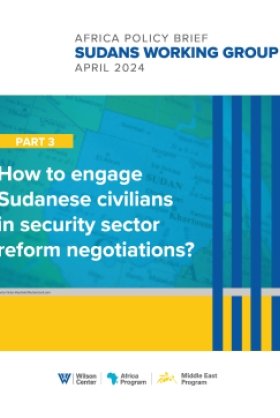How to Engage Sudanese Civilians in Security Sector Reform Negotiations?



The ostensible trigger for the outbreak of hostilities between the Sudan Armed Forces (SAF) and the Rapid Support Forces (RSF) on April 15, 2023, was disagreement about the nature and timing of merging Sudan’s two legally constituted armed forces. SSR was one of five issues left for further negotiation when a “Framework Agreement” was being negotiated in December 2022, between the SAF, RSF and civilian representatives led by the Forces for Freedom and Change (FFC) for creation of a new transitional government. With neither the SAF nor the RSF in a position to “win” the now year-old civil war, any negotiated peace will need to address the issue of security sector reform. Given the major, long-standing role the security forces, especially the SAF, have played in the politics and economy of Sudan, SSR in the Sudanese context will be more complicated than a force integration/force reorganization matter. Sudan’s citizens thus have legitimate interests, like nature of the economy, budgetary priorities and balancing human versus state security, that warrant their having a meaningful role in SSR negotiations. As one of the April 2 session speakers said, SSR must be guided by a political and national agenda, not a purely military one.
The Sudans Working Group (SWG) engages US, African, and international policymakers and stakeholders in inclusive and forward-leaning policy dialogue aimed at advancing the prospects for peace, security, and development between and within Sudan and South Sudan. The SWG serves as a space for key stakeholders to share analyses and perspectives and provide policy options for addressing critical issues related to the two countries. The SWG is currently co-chaired by Ambassador Nureldin Satti and Ambassador Donald E. Booth.

Africa Program
The Africa Program works to address the most critical issues facing Africa and US-Africa relations, build mutually beneficial US-Africa relations, and enhance knowledge and understanding about Africa in the United States. The Program achieves its mission through in-depth research and analyses, public discussion, working groups, and briefings that bring together policymakers, practitioners, and subject matter experts to analyze and offer practical options for tackling key challenges in Africa and in US-Africa relations. Read more


Middle East Program
The Wilson Center’s Middle East Program serves as a crucial resource for the policymaking community and beyond, providing analyses and research that helps inform US foreign policymaking, stimulates public debate, and expands knowledge about issues in the wider Middle East and North Africa (MENA) region. Read more



